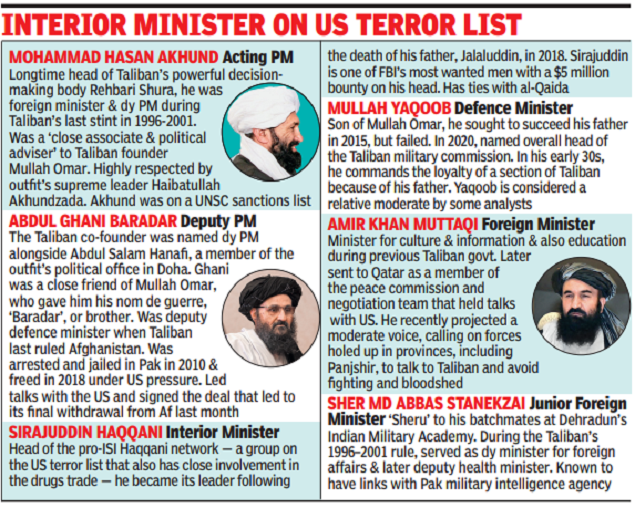ISLAMABAD: The Taliban announced on Tuesday a 33-member team for an interim government that will be headed Mullah Mohammad Hasan Akhund, one of the movement’s founding members who had also been foreign minister and then deputy prime minister in the group’s previous 1996-2001 regime. The group’s co-founder, Mullah Abdul Ghani Baradar, whose negotiations with the US led finally to the latter’s pullout from Afghanistan, will be his deputy.
Akhund, now acting PM, has been the head of the Taliban’s Rehbari Shura, or leadership council, for about two decades. Baradar, or brother, a fighting name bestowed on him by the late Taliban founder Mullah Omar, whom many expected would lead the Taliban government this time, had been deputy defence minister in the group’s last stint in power and had served prison time in Pakistan, the latter distinction possibly costing him the top job.
Taliban spokesman Zabihullah Mujahid, announcing the interim appointments at a press conference, declared the country would now be called the “Islamic Emirate of Afghanistan”. All 33 members were picked up from the group; not a single non-Talib has been included. “Afghanistan has gained freedom and only the will of Afghans will be applicable in the country. After today, no one will be able to interfere in Afghanistan,” the Taliban spokesman vowed.
Sirajuddin Haqqani, son of Jalalauddin Haqqani, the founder of the Haqqani network, designated a foreign terrorist organisation by the US, has been appointed acting interior minister, while Mullah Mohammad Yaqoob, son of the slain Taliban founder Mullah Omar, has been named as the defence minister. Yaqoob had attempted to take his father’s place and had to be placated when he did not succeed.

Hidayatullah Badri will be the acting minister of finance. Amir Khan Muttaqi has been made acting foreign minister and Sher Mohammad Abbas Stanikzai will serve as his deputy. Zabhiullah Mujahid, the man without a face photographed only after the fall of Kabul recently, has been given charge of the information ministry, and Fasihuddin Badakhshani has been named army chief.
The spokesman did not mention any role in government for the Taliban chief, Mullah Haibatullah Akhundzada, He has not been seen or heard in public for almost two years, including after the collapse of the Western-backed government and the takeover of Kabul by the Taliban in August. In June this year, there were media reports that he had died due to Covid-19, but the Taliban had denied it. On Monday, Mujahid had said that Akhunzada would appear soon.
Many of the names announced by Mujahid were old faces, the majority of them Pashtuns. Despite claims that the government would be inclusive, they did not take into consideration members from other ethnic groups. Women are not part of the caretaker setup. When asked why, Ahmadullah Wasiq, member of the Taliban cultural commission, said the cabinet had not been finalised yet.
Observers believe the announcement of the acting government by the Taliban has not paved the way for the international community to give them recognition.
“The amount of time spent wasn’t on discussing or negotiating inclusivity or potential power-sharing with other political parties. That time was spent on knowing how to split that pie amongst their own ranks,” Obaidullah Baheer of the American University of Afghanistan told media from Kabul.
Meanwhile, acting PM Hasan Akhund congratulated Afghans on the “withdrawal of all foreign forces, the end of the occupation and complete liberation of the country”. He said that the leaders would “work hard towards upholding Islamic rules and Sharia (Islamic law) in the country, protecting the country’s highest interests, securing Afghanistan’s borders, and ensuring lasting peace, prosperity and development”.
All governance and life in the country will henceforth be in accordance with Islamic law, Akhund said. He added that the Taliban wanted strong and healthy relations with all countries based on mutual respect.
“We are committed to all international laws and treaties, resolutions and commitments that are not in conflict with Islamic law and the country’s national values,” the new Afghan ruler stressed. He also emphasised that the interim government would take “serious and effective steps” to protect human rights as well as the rights of minorities and underprivileged groups within the framework of the demands of Islam.





































